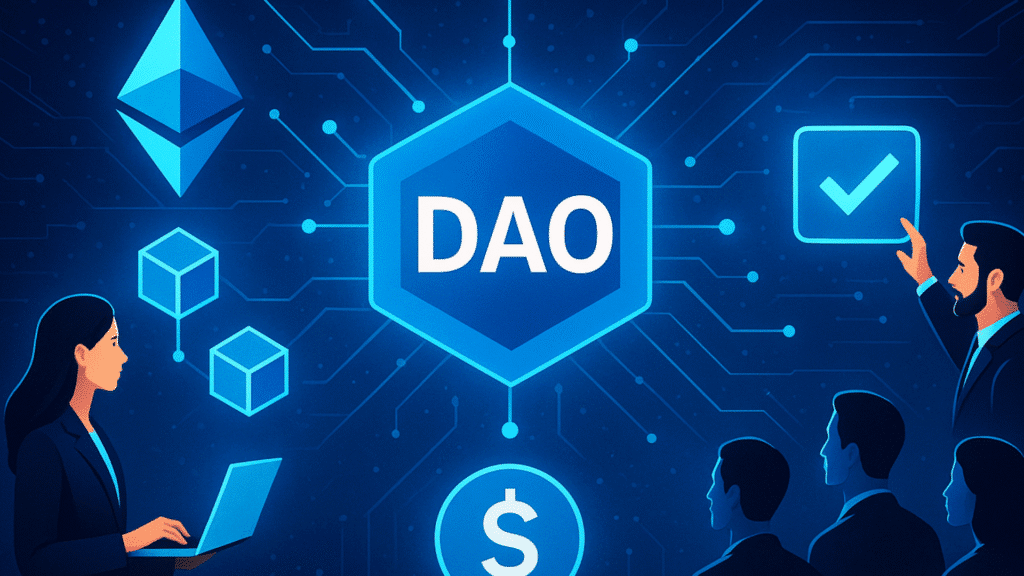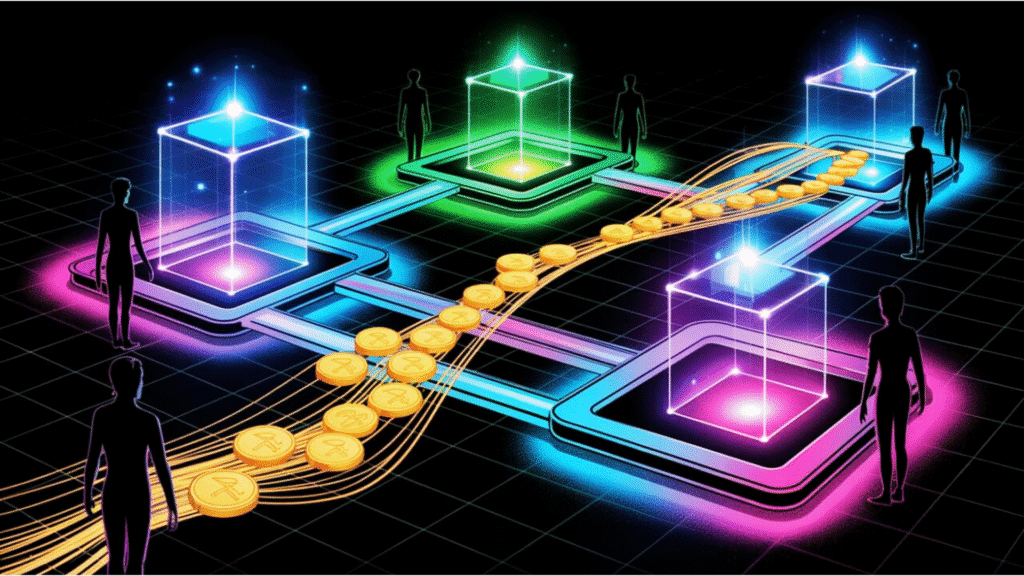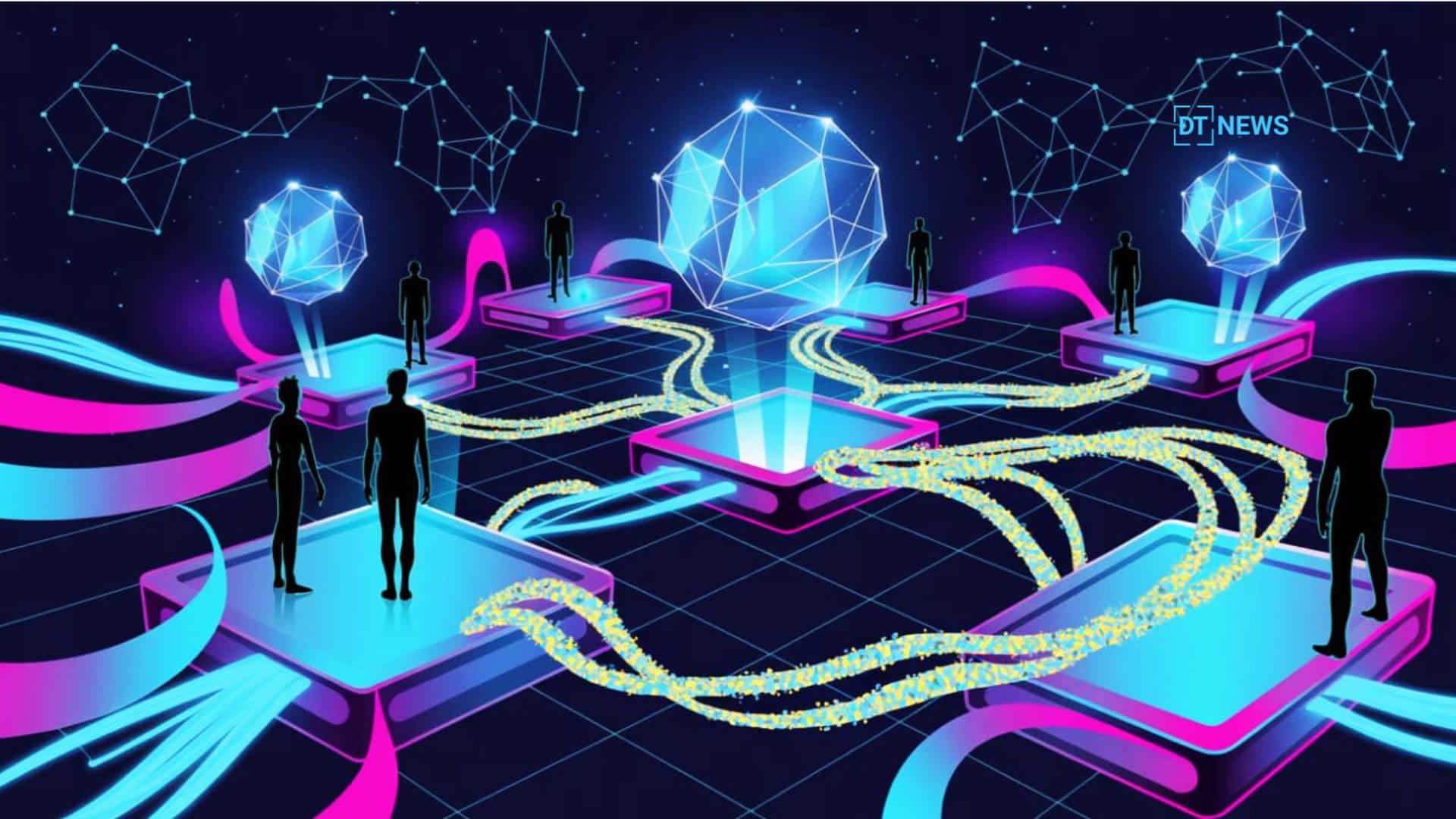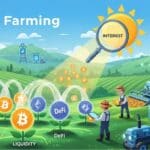The decentralized autonomous organizations (DAO) model is quickly changing how governance works in business and community settings. In contrast to an ordinary organization, which has a hierarchical structure and a leadership, a DAO is essentially a members’ democratic system.
- What Is a Decentralized Autonomous Organization?
- How Does a DAO Function?
- What Types of DAOs Exist Today?
- What Are the Advantages of DAOs?
- What Challenges Do DAOs Face?
- How Are DAOs Innovating in 2025?
- What Is the Legal Status of DAOs?
- How Can One Create a DAO?
- Conclusion
- Glossary
- Frequently Asked Questions About Decentralized Autonomous Organization
Voting, treasury management, and project executions are done according to the pre-agreed rules that are encoded into the system. The whole setup is very efficient, to say the least. It is open to scrutiny. It is done automatically.
It still allows for maximum participation from the side of those involved. The proponents of the idea state that such a structure, in the long run, could have an enormous impact.
This is not only on the way people invest but also on the way social projects are carried out and even how local governments function. It thus provides a new model for governance that is participative and decentralized.
What Is a Decentralized Autonomous Organization?
A decentralized autonomous organization is a structure that is managed solely by protocols written in smart contracts on a blockchain. Those contracts describe how the DAO works, for instance, its way of deciding, using the money, and letting the members take part.
DAOs, in contrast to typical corporations which depend on CEOs or boards, return the authority to their members collectively, in most cases, according to the amount of governance tokens each stakeholder has.
Daniel Kwan, a blockchain analyst, explains that a DAO works like a community with a shared bank account. Every financial and operational decision is clear and happens automatically. It removes middlemen while keeping members responsible.
Since the decentralized autonomous organization is run by all its members, no one person is in control. Decisions are made together, and the members decide the direction of the DAO. This is very different from traditional companies with a top down setup.
How Does a DAO Function?
DAOs work through the use of smart contracts, which are automated agreements that live on decentralized networks like Ethereum. These contracts act as the company bylaws and verify that the decisions endorsed by the token holders are carried out without any human intervention.

The existence of a DAO is marked by the installation of smart contracts that detail the modes of governance, the distribution of resources, and the qualifications of the members. Subsequently, the community is issued governance tokens that represent their influence in the decision making process.
Members can get these tokens by buying them or contributing to the organization. This lets them take part in decision making. When proposals are submitted, the smart contracts carry out the approved decisions automatically.
This keeps everything transparent and reduces mistakes. Most DAOs follow a one token, one vote system, but some use other methods to balance influence and keep voting fair.
What Types of DAOs Exist Today?
DAOs have developed into different types based on what they do. Protocol DAOs run decentralized platforms such as Uniswap or Compound and take care of upgrades and managing funds. Investment DAOs bring members’ money together to invest in projects or assets.
They provide a clear and open way for members to make decisions together. Collector DAOs are focused on buying shared digital or physical assets. Grants and social decentralized autonomous organization provide funding for public projects and social causes, like organizations such as Gitcoin.
In 2025, hybrid DAOs are becoming more common. They use tools like Discord and Notion alongside Web3 governance systems. This combination makes it easier for members to coordinate, participate, and use the platform while keeping the organization decentralized.
What Are the Advantages of DAOs?
The decentralized autonomous organization model has many advantages compared to traditional organizations. Transparency is one of the main benefits. Every transaction and decision is recorded on a permanent ledger that all members can see.
This helps build trust among participants. DAOs can reach people all over the world. Anyone who has the required tokens can take part, which removes geographical and institutional barriers. DAOs are highly efficient.
Decisions and fund management are handled automatically by smart contracts, which reduces delays and avoids extra paperwork. The token based system encourages members to work in the organization’s best interest. It also promotes collaboration among participants.
DAOs keep trying new governance methods to make decisions better and share power more fairly. Julia Lin, a blockchain governance consultant, says that DAOs make it possible to run governance in real time and automatically, reaching people all over the world. Traditional companies often find it hard to do this efficiently.
What Challenges Do DAOs Face?
Even after all the advantages, DAOs still struggle with major issues in 2025. One of these issues is that voter participation is still very low, and some DAOs have even recorded less than 18% of the members casting their vote, thus questioning the trustworthiness of the governance results.
Another problem that is closely related to this issue of power concentration is that a few, namely, small in number, large token holders can have almost all the decision-making power, which eventually erodes the core idea of decentralization.
With the increase of members in a DAO it gets difficult to coordinate everyone and it takes longer to reach an agreement. Security risks have been considerable, with decentralized autonomous organization (DAO) hacks making up more than $300 million in losses in 2025 alone, thus highlighting the vulnerabilities in the code of smart contracts.
The lack of clear regulations is the main reason why DAOs are faced with such a situation, as only a few regions, like Wyoming in the United States, are recognizing them as legal entities.
It is still very challenging to trace and ensure that these groups meet the set standards because they are not controlled by any central authority.
How Are DAOs Innovating in 2025?
DAOs are evolving quickly as technology improves. Some use artificial intelligence to help run the organization. AI can look at proposals, guess what might happen, and take care of routine decisions. This makes the DAO work more smoothly.
More than 200 DAOs now use decentralized identity systems to check members while keeping their information private. This helps prevent cheating or fake votes. New decentralized autonomous organization as a Service platforms have made it easier to start and run a DAO.
Even small projects or people without technical skills can now create and manage one. Security in DAOs has gotten better. Multi signature wallets, regular audits, and formal checks are now common to keep assets safe.
Big financial and investment organizations are also showing more interest in DAOs for decentralized finance. These improvements make DAOs easier to scale, more efficient, and useful in real world projects.
What Is the Legal Status of DAOs?
DAOs are starting to be recognized legally, but the rules are still different around the world. In Wyoming, United States, DAOs are officially treated as legal entities.

The state also requires them to follow rules and be transparent in how they operate. In other parts of the world, DAOs operate in uncertain legal areas. This means members could face legal issues or government actions.
Experts are of the opinion that the new regulations will address issues of responsibility, taxation, and the legalization of smart contracts as court enforceable instruments. The main idea is to help innovation to continue flowing while giving a safety net to people in the growing DAO ecosystem.
How Can One Create a DAO?
The process of setting up a DAO includes different significant stages. The initial one is to decide on which blockchain platform the DAO will function. Ethereum is still the most popular one because of its well developed smart contract features, and after that, there are other choices such as Solana or Avalanche.
After that, the founders create smart contracts that are safe and able to govern rules for membership, proposals, voting, and financial management. The decentralized autonomous organization also needs clear governance rules.
These regulations demonstrate the procedure of voting, the least number of votes required, and the way in which the approved proposals are executed. Subsequently, the DAO begins functioning and is financed by issuing governance tokens to members.
These tokens provide money for the DAO and give members the right to vote. Finally, it is important to keep members engaged and help the DAO grow. This can be done with incentives, community tools, and platform like Aragon.
Regular security checks and ongoing updates to governance rules help make sure the decentralized autonomous organization stays safe and works well over time.
Conclusion
Decentralized autonomous organizations (DAOs) are an innovation that significantly changes how people create and handle groups or projects that require collective decision making.
These organizations, which are the result of the combination of blockchain, smart contracts, and in the future probably artificial intelligence, provide governance systems that are transparent, democratic, and open to everyone worldwide.
Although problems such as regulatory uncertainty, lack of interest of voters, and presence of vulnerabilities in the technical side still exist, innovations in AI integration, security, and user engagement are strengthening and making DAOs more accessible than ever.
Experts believe that as more people use them, DAOs will make governance more democratic, back social projects, and change how economies work. In short, the decentralized autonomous organization is more than just an alternative, it could become the model for future organizations.
Glossary
Grants DAO: A DAO that supports social or public projects through member votes.
Protocol DAO: A DAO that runs and manages decentralized platforms.
Collector DAO: A DAO that buys and shares digital or physical assets.
Hybrid DAO: A DAO that mixes Web2 tools like Discord with blockchain governance.
AI in DAOs: Using AI to help make smarter and faster decisions automatically.
Decentralized Identity: A way to verify members safely while keeping their privacy.
Frequently Asked Questions About Decentralized Autonomous Organization
How does a DAO make decisions?
DAOs make decisions automatically using smart contracts and votes from their members.
What types of DAOs exist?
There are protocol DAOs, investment DAOs, collector DAOs, grants DAOs, and hybrid DAOs.
What are the benefits of DAOs?
DAOs offer transparency, efficiency, global participation, fair voting, and innovative governance.
What challenges do DAOs face?
DAOs face low voter turnout, power concentration, coordination problems, security risks, and unclear rules.
How are DAOs innovating in 2025?
In 2025, DAOs use AI, hybrid platforms, decentralized IDs, and stronger security to improve governance.






































